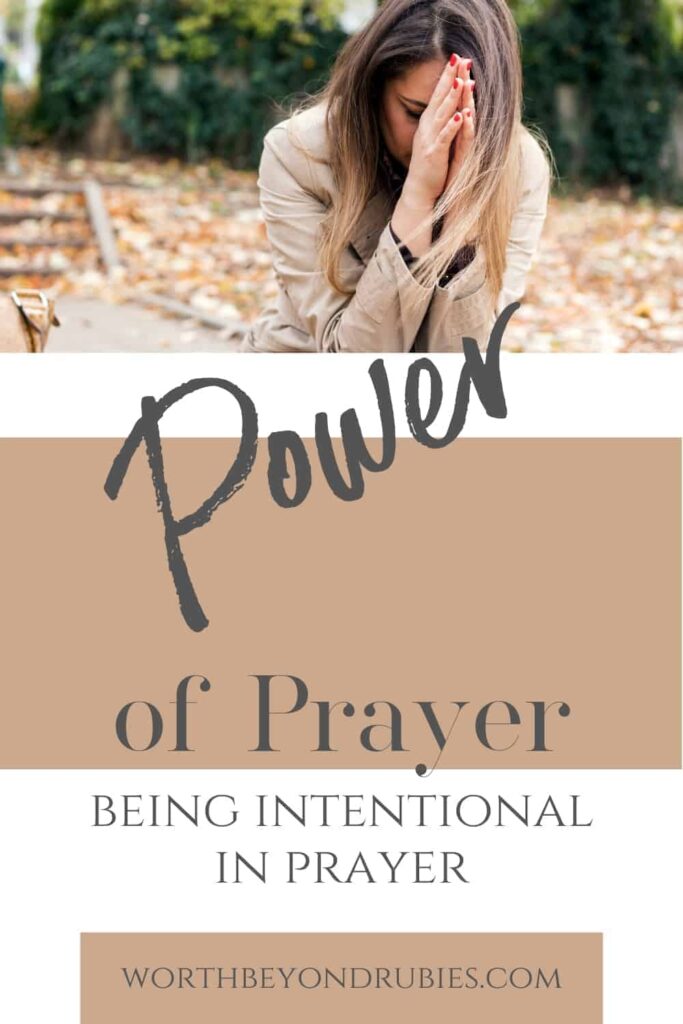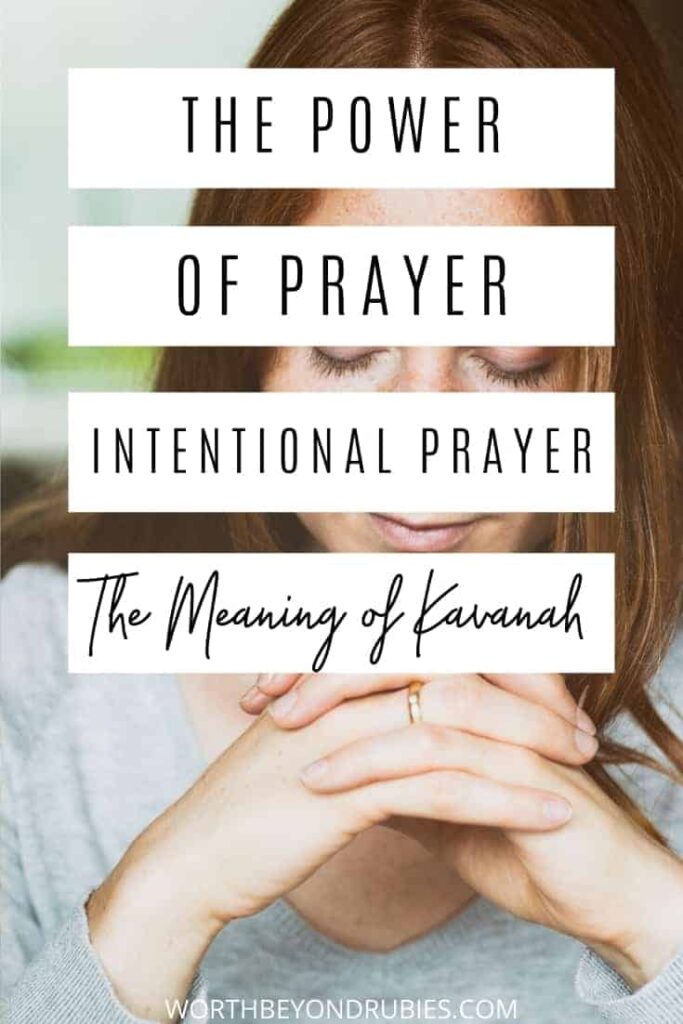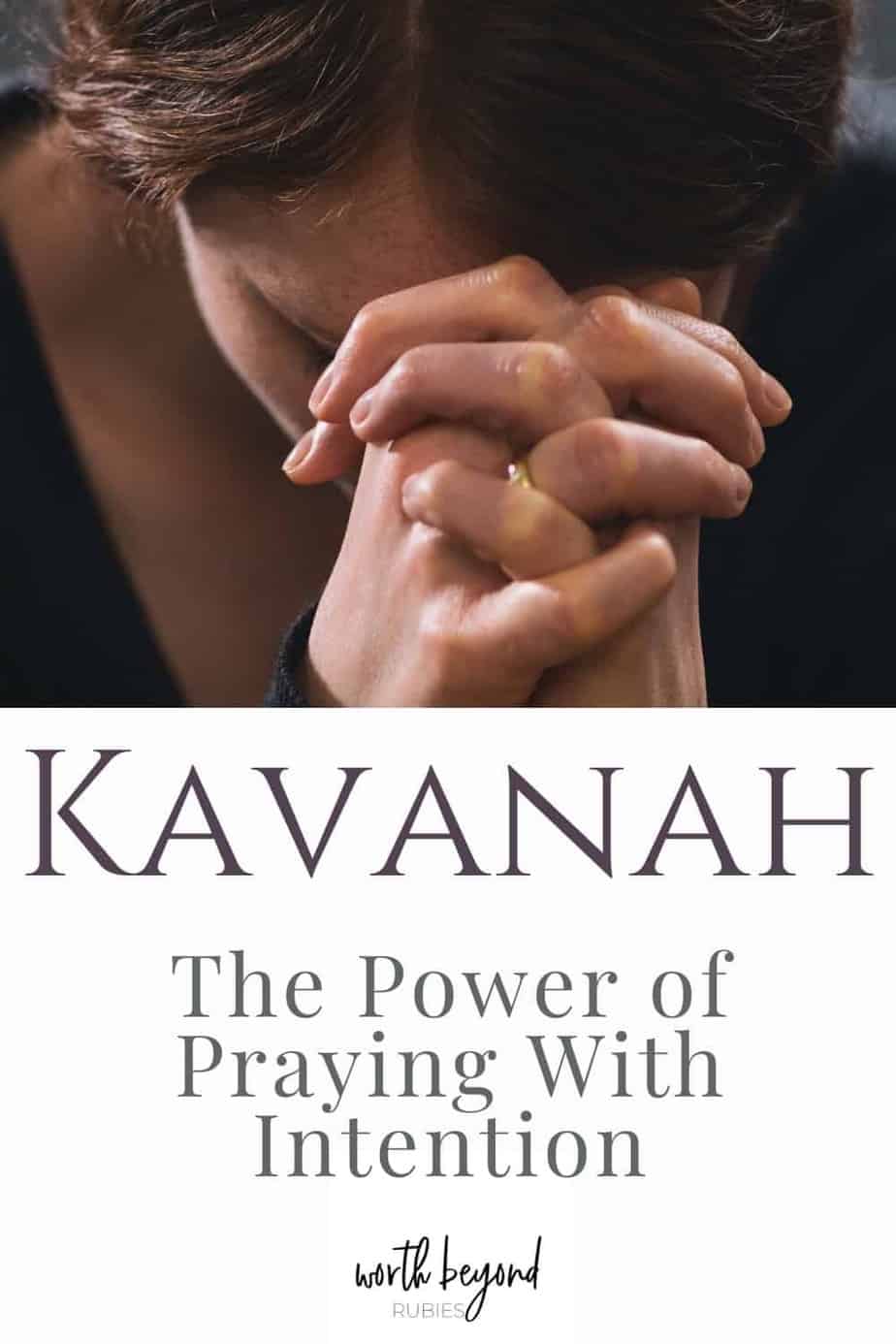The Power of Prayer – Praying With Intention
Please note that this article may contain affiliate links. As an Amazon Associate, I earn on qualifying purchases at no additional cost to you. You can read more at the bottom of this page or read my full disclosure on my Affiliate Disclosure Page
The power of prayer is undeniable and one of the most powerful weapons we that the Lord has given us. We all want that close, intimate prayerful relationship with our Lord and King.
But do you find that your prayers sometimes seem to fall flat?
Do you feel like you just go through the same motions day after day, week after week without feeling that connection?
That power of prayer can feel lost on us when there is a disconnect in our prayer, when we don’t feel we are in fully present.
Learn how to pray with intention and meaning and foster that relationship with the Lord that He intends for you to have; learn about ‘kavanah‘!
Updated and republished from 5/27/2020
Harnessing the Power of Prayer is Like Tending a Garden
This past spring I spent a lot of time gardening. We are building a greenhouse so in the meantime I had seedlings growing in containers all over my back deck until they could be moved into their permanent homes.
I planned out what I wanted to plant, I bought the seeds and planted them. I tended to them and cared for them and they became thriving seedlings and grew quite well! So I expected to have a great harvest from them before too long.
But what if I had planted these seeds and just left them? What if I hadn’t tended to them or nurtured them? Sure, some may have grown in spite of that but they would have died off fast enough.
Prayer is much like that!
The Bible displays the power of prayer in the fact that, apart from the Psalms, there are 140 references made to prayer. In many of these cases, the Bible also gives us the words they spoke in prayer. It is THAT important to the Lord!
The Power of Prayer is Found in Intentional Prayer or ‘Kavanah’
I am a Jewish believer so I attend synagogue each week. My husband is non-Jewish so we also attend church. Both of us attend each!
In synagogue we follow a prayer book known as a Siddur and we pray Shabbat prayers that are being prayed all over the world by Jewish people in every nation on earth. Not only that, but we are enjoining ourselves to our ancestors who prayed these same prayers for millenia.
So how do you pray the same prayers every week, every festival, and, for many, every day multiple times a day without them losing their meaning?
And that is what I want to talk to you about today. I want to talk to you about intentional prayer.
In Hebrew, this is known as ‘kavanah‘.
Kavanah means to pray with intent and mindfulness. It means to pray with purpose and with sincere feelings, where your heart and your mind are engaged in the act of coming before the King of Kings, the Lord of all creation.
You see, praying liturgical prayers isn’t what keeps you from closeness with the Lord any more than reading the same verses from the Bible over and over disconnects you. What disconnects you is a lack of intention and mindfulness; a lack of kavanah.
Would you like to have a copy of this post to read whenever you’d like with no ads, no pop ups and in a printable format? Get your copy of the Power of Prayer E-Book for only $5
My Morning Prayer Time
I will give you an example from my own prayer time.
I went to great measures to protect that time with my Abba and make sure I did it before work or duties at home kept me from it.
But what I found happening was that I would sit and pray and my mind would become downtrodden because it had this list of things I needed to do that morning for work or around the house.
Rather than coming to the Lord with a fresh mind and clear intent, I was coming heavy laden with a to-do list for the day.
I had made prayer time a religious act that had to be done no matter what, even if I had tasks hanging over my head.
I had made prayer time a religious act that had to be done no matter what, even if I had tasks hanging over my head. Share on XI was failing to enjoy my time with the Lord and rather I was feeling obligated to it. I felt like something I had to slip in rather than something I NEEDED for myself. My mind was elsewhere through no fault of my own. I have anxiety and that is just what it does when I have things on my plate.
When I first wrote this post, I said I used to try to get my work done first but then I soon realized that many times I was allowing the day to get ahead of me instead of me getting ahead of the day. My prayer should come before all else and praying the way my ancestors prayed had allowed me to do that.
By starting my day off by thanking the Lord before I even get out of bed in the morning, just for allowing me the opportunity to have another day to live meaningfully, I am giving the firstfruits of my day to Him.
Then I spend time just sitting and focusing, preparing for prayer. In doing that, I also give Him all my responsibilities for the day and ask Him to take them off my shoulders so I can spend this time with Him. I don’t rush headlong into prayer. I stop and lay my burdens down first. I go to Him with purpose and with intention, with kavanah, as though I am approaching the King because that is who He is!
It has made a HUGE difference.
I now have this peaceful time with Him where I can pray my morning prayers with kavanah and be fully present with Him. The day will always be there. Work will always be there.
The Power of Prayer – Being Present and Mindful
The words you say are not what disconnects you. It is the meaning and intention, the attentiveness behind them, or lack thereof, that connects you or disconnects you. It is the kavanah in your prayer that connects you.
As Jewish people, whether Messianic or not, praying from the Siddur does not mean we don’t pray other prayers or speak to God in a personal way. We just enjoin the two.
We prepare before prayer by focusing on Him and understanding we are about to approach Hashem, our Lord. Each word is said with love and awe and respect and praise.
Maimonides said “The mind should be freed from all extraneous thoughts and the one who prays should realize that he is standing before the Divine Presence.” (Hilkhot Tefilah – Laws of Prayer)
Each word of the Shema is said with mindfulness of Him and His greatness. When I say the Shema I say each word slowly, meditating on each one and recognizing who I am (Shema Yisrael…Hear oh Israel) and who HE is (Adonai Eloheinu, Adonai ECHAD…the Lord our God, the Lord is ONE).
Prayer is a conversation we have with our Lord! The power of prayer comes with listening as well as speaking.
You see, my garden, when I tend to those seedlings, will go on to yield fruit. It will produce for me as I put into it. I will have a harvest. And our prayers and our relationship with the Lord does the same.
If we approach Him in relationship, if we nurture that relationship He has desired to have with us since the beginning of time, we too will produce fruit and reap a harvest of blessings.
The Power of Prayer Can Be Diluted By Rote Prayer Without Kavanah
Non-Jewish believers or believers who do not use written prayers are not immune to this lack of mindfulness!
If you get up every day and praise the Lord in the exact same manner, repent of your sins in the same way with the same list, make intercession by reading off a list of names, and give thanksgiving for the same things, you too can run into praying rote prayers without meaning.
We can have our prayer list in front of us, the same list we have prayed over all week, and just read it off like a to-do list if we are not present and mindful of each and every name, each and every need.
If we are just rushing to get through prayer so we can get to the dishes, we are not giving the Lord our time any more than an adult child is giving a parent their time just because they rush in with dinner for them and then rush back out.
Kavanah Gives More Power to Prayer
Kavanah gives us a prayer life that has deepness and meaning whether you are praying the same words spoken for generations or crying out to Him in a moment of need.
Praying intentional prayers and being in the moment in front of the mercy seat will give you a relationship with the Lord that will be deep and meaningful and yield much fruit.
Coming away from the pressures and obligations of the world allows us to enter that time with Him like I imagine Eden was, where you just walk with Him in the cool of the day without any concerns for the day to day trials life brings.
How Do You Pray Powerful Prayers of Intention?
So how do you do that? How do you come away from the world and be fully present with the Lord? How do you pray liturgical prayers with kavanah, with mindfulness? How do you experience the power of prayer in fullness?
How Do You Pray Powerful Prayers With Kavanah?
Take a Moment to Focus on God
Ok wait a minute! We are about to pray! Isn't THAT focusing on God?
Well, yes...but HOW are you approaching Him? All this means is that sometimes, when we pull ourselves away from life, even from sleep, we should take a moment to fully grasp that we are coming into the presence of Adonai! We are approaching the throne of the Lord.
We can lose sight of that sometimes. We get into such a habit in prayer that we can lose the absolute AWE of it.
So take a moment to remove yourself from whatever you had been doing prior and enter the Holy of Holies with awe and wonder.
Maimonides, the Jewish philosopher and Torah scholar also known as the Rambam, said that if a person finds they are distracted or confused, they must first regain their composure before praying!
Minimize Distractions
If you do not have a private place where you can go pray, at the very least minimize the distractions around you. Go into your car if you have to! Go for a walk!
This is your time with your Abba! If it is at all possible, spend it alone with Him.
I know this is difficult if you have littles but if you can get 5 minutes of focused, intentional prayer vs 20 minutes of the phone ringing and kids fighting, take the 5 minutes!
Prayer is not a matter of quantity but quality.
For Liturgical Prayer, Embrace Every Word
It is easy, if you are used to liturgy, to just read words you've read a thousand times. But stop and really absorb those words. Let them become part of your own personal prayer.
Just because Jewish people (Messianic or not) pray from the Siddur, it doesn't mean we do not make each word meaningful to us individually and as part of Israel as a whole.
If you are a Messianic Jew, learn the prayers from the Siddur and find the personal meaning of them for you. When I say the Shema, it means something to me personally as well as corporately. I fall in love with each and every word of the Amida.
Praying the Word - Make Every Word Living
We can also lose sight of that personal intention when we pray the Word. Any time we pray something that involves reading it is easy for our mind to disconnect from it and that includes praying the Word.
The enemy loves to distract us and when we read, especially without reading out loud, it is easy to gloss over things or for your mind to wander.
Have you ever read a page in a book and then felt like you didn't even see it? We can get that way with the Word too. It's ok...we ALL do it. I know I do...I am not so super-spiritual that I won't say I have read a chapter in the Bible and then wondered what I just read!
Make every word come to life for you! Each verse, stop and think about what that means to you. For any attributes of God you read, stop and thank Him for those attributes.
In Judaism, the Word of God is not only for reading. It is for study and it is for prayer. Jewish thought is that reading the Word out loud, letting the Word of the Lord emanate from our lips, is a form of worship. The Psalms in particular are used in such a way.
In fact, the Psalms make up a good number of prayers found in the Siddur, the Jewish prayer book.
Scripture is alive! Let it speak to you (and let it speak FROM you) by pausing and letting it seep into your heart!
Have you found ways to pray that help you to stay focused and mindful? Share in the comments!
And please visit my YouTube channel for a video on this topic of kavanah!

If you would like to have a copy of this post for reference in E-Book form then click on the image and download your own copy for only $5 without ads or pop ups! Includes video link embed as well so you can reference it whenever you’d like!




Diane, this is beautiful! I can identify with what you were saying about making sure I did my prayer time before anything else, but then coming with a mind full of everything else that needs done, ultimately lacking intention and mindfulness. I have been frustrated with my prayer time for a very long time, and I believe Kavanah is the answer! Thank you so much, I always learn so much from you!
Thank you!! I am so glad you enjoyed it Donna! I know exactly what you mean about having that to-do list hanging over you during prayer time because that was so me! Just even being aware of kavanah helps me because even when I am praying my mind can wander. So just being aware of practicing intention makes you more focused and present!
I love this “intentionality” in prayer! I grew up Catholic- rote prayer was all I knew. But while in mass one day, I looked over to see a young woman praying the same prayer as me, but with eyes shut, face towards heaven, and a look of complete serenity on her face. I thought to myself, “that’s what I want.” It took years of learning (or unlearning?) to get to the same place, but what a joy it is. I’ve written many posts on prayer, and have one ready to go next month as well. Prayer is food for my soul!
Yes it IS a joy when you find that place that you can still reach that kavanah, that intentionality, even when reading a prayer (or book of prayer) someone else wrote! Thank you for sharing your experience with it!